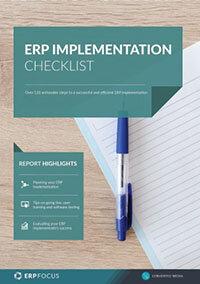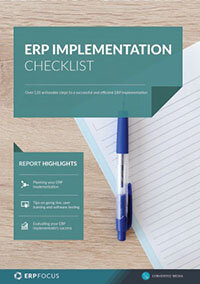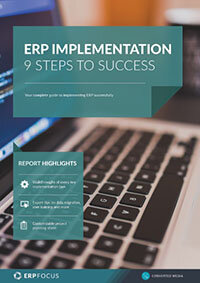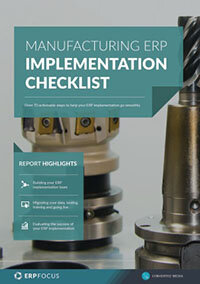ERP and implementing best practice
The term 'best practice' is commonly and increasingly used by ERP providers and system integrators (SIs) but, as with the term ERP itself, there is no universal agreement as to what it means. Just as the term ERP is now applied to everything from an accounting system upwards, the label of best practice can be applied to, or claimed for, a range of different things, and not always correctly. To avoid coming at this discussion with a scatter-gun approach, this article confines itself to two headings: implementation best practice and software best practice.
Implementation best practice
This is the easiest of the two to address and, in fact, there is a wealth of information on its key elements already available in our implementation planning guide. Consultants and system integrators pitching for your business will claim best practice in a number of areas, including:
- requirements analysis and documentation,
- change management,
- project management,
- consultancy,
- training, and
- go-live planning and support.
They will usually have impressive procedure manuals to back up their claims (whether or not their consultants adhere to these procedures, or even have time to adhere to them, will be the subject of a future article). Nevertheless, best practices in these areas do exist and it is only necessary for companies to question consultants and SIs sufficiently to confirm that there are no misunderstandings when getting into details. For example; the consultants might claim that it is best practice for the client to create an initial requirements document so that their people can be briefed in advance, or they might say that it is best for their people to draw up that document themselves.
Software best practice
The phrase 'best practice' is even more widely used when referring to software functionality. Suppliers of Tier 1 systems have a big problem when presenting their software to prospective customers because the size and complexity of their systems make them very difficult, if not impossible, to demonstrate. These large systems take weeks and months of configuration, and frequently extensive modification, to mirror customer requirements and it is just not practical to expend that amount of effort before contracts have been signed.
Some ERP providers claim to have preconfigured industry-specific templates but are reluctant to use them for demonstration purposes, so their challenge is to convince prospects that their system is the best choice without actually being able to demonstrate it. In order to do this, they have several strategies.
One is to adopt the approach of “Our system is used by Megacorp and, if it's good enough for them it must be ideal for you”. All the better if Megacorp is in the same industry as the prospect and they are using the same modules but, if they are only using, say, the accounting modules and the prospect wants to use the HR modules, then the reference is less useful.
So a second approach is to claim that the system 'conforms to best practice'. All companies like to think that the way they operate is best practice so this can be an easy sell, particularly when claiming preconfigured industry templates. If a prospect is in, say, the aerospace industry, then hearing that Boeing or Airbus use the system can reinforce the best practice claim regardless of differences of scale – even small companies want to be big.
But there are questions that companies need to ask their suppliers to ensure that they will be getting what they expect. The first thing they need to know about these best practices in their industry is who has decided what they actually are. Were they established by a trade organization, or by independent consultants, or by the ERP supplier's own people?
The second thing they need to check is how frequently best practice is reviewed within the system. Things change, and what is considered to be best practice can also change. For example; not many years ago, it would have been considered the best practice to mail hard copy sales invoices to customers. But then it became common for companies to fax them directly from their system, and nowadays many companies are not only sending them automatically from their system to their customers' systems but are doing so automatically on item dispatch; so effectively the dispatch department is creating the invoice. So have best practices changed?
Even when best practice has been reviewed regularly, questions remain. In, say, the furniture industry; is best practice in a large company that makes to stock the same as in a small company that makes to order? And, in the pharmaceutical industry, is best practice at a manufacturer the same as best practice at a distributor; and is best practice at a multi-site distributor the same as best practice at a company with one central warehouse? I suspect that those companies might not all agree.
One last thought: this discussion has assumed that adhering to best practice is the best option. But is that always true? It may seem self-evident that it is; but accepted best practice is probably by definition the way that many organizations are doing things, so if a company adopts those practices, they will not be doing anything that at least some of their competitors are not already doing. That probably means that, by implementing a new ERP system, they are merely playing catch up and not gaining a competitive advantage. And that would be a shame.
Free white paper

ERP Implementation Checklist
Over 120 actionable steps to implementing a new ERP successfully

Featured white papers
-

ERP Implementation: 9 steps to success
The 9 proven steps you should follow when implementing ERP
Download -

ERP Implementation Checklist
Over 120 actionable steps to implementing a new ERP successfully
Download -

Manufacturing ERP Implementation Checklist
Over 70 actionable steps to rolling out new manufacturing ERP software
Download
Related articles
-

ERP implementation plan (ERP implementation process guide)
Everything you need to know about running a successful ERP implementation - and we mean everything
-

How the right ERP can help you launch a successful omnichannel business
Petersen Zhu, CEO of DigitBridge and Vibes Base, shares how to create a scalable omnichannel stra...
-

The case for multi-tier ERP implementations
Learn more about multi-tier ERP implementation and why you might need one

